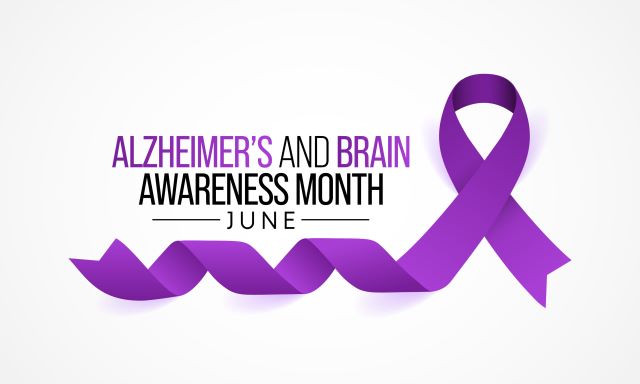Alzheimer’s and Brain Awareness Month
June 6, 2024
Huntington Woods strives to provide a safe and calming environment for those diagnosed with Alzheimer’s or dementia. In our 45-bed secured dementia unit, we provide 24/7 care, activities, and support to our residents with these diagnoses. Currently, there is no cure, but medications and management strategies do exist in order to help with temporary improvement.

Alzheimer’s is defined “a degenerative brain disease of unknown cause that is the most common form of dementia, that usually starts in later middle age or in old age, that results in progressive memory loss, impaired thinking, disorientation, and changes in personality and mood, and that is marked histologically by the degeneration of brain neurons especially in the cerebral cortex and by the presence of neurofibrillary tangles and plaques containing beta-amyloid” (“Alzheimer’s disease.” Merriam-Webster.com Merriam-Webster, 2024.).
Mild-Memory loss that disrupts daily living, including losing track of dates
-Poor judgement, leading to bad or questionable decisions
-Repeating questions or forgetting recent information
-Wandering or getting lost
-Mood and personality changes
-Increased anxiety and/or aggression
-Challenges in planning or problem solving
-Taking longer or having difficulty completing normal daily tasks, including handling money
-Loss of spontaneity and initiative
-Losing or misplacing things in odd places
Moderate-Withdrawal from social activities
-Inability to learn new things
-Shortened attention span
-Difficulty with language, problems with reading, writing and working with numbers
-Difficulty organizing thoughts and logical thinking
-Problems coping with new situations
-Problems recognizing family and friends
-Hallucinations, delusions, paranoia, impulsive behavior, inappropriate emotional outbursts
-Restlessness, repetitive movement, agitation, anxiety, wandering
-Changes in sleeping patterns
-Difficulty carrying out familiar and multistep tasks
Severe-Inability to communicate
-No awareness of recent experiences or surroundings
-Seizures
-Increased sleeping
-General physical decline
-Difficulty swallowing, weight loss and little interest in eating
-Groaning, moaning and grunting
-Loss of bowel and bladder control
-Make sure the person is comfortable
-Listen carefully, offer encouragement
-Allow time to respond and be respectful
-Communicate clearly and calmly
-Encourage nonverbal communication
-Use short and simple sentences
-Approach from the front, and stand or sit where you can be heard as clearly as possible
-Make eye contact
-Try to avoid asking too many or complicated questions
-Consider the feelings behind words or sounds
-Be patient
The Alzheimer’s Association (https://www.alz.org/)
-The Cleveland Area Chapter of the Alzheimer’s Association provides free care and support services to individuals and families living in Ashtabula, Cuyahoga, Geauga, Lake and Lorain counties.
-ALZConnected is a free online community where people living with Alzheimer’s, caregivers, families and friends can ask questions, seek advice and find support.
-Alzheimer’s Association Online Education Center covers topics including basics and caregiving advice. These can be accessed 24 hours a day and are free.
Alzheimer’s Foundation of America (https://alzfdn.org/)
-Offers a national toll-free helpline (866-232-8484)
-Caregiver Support Groups are run by licensed and dementia trained social workers who lead weekly meetings by phone.
-Care Connection Webinars are free, and offer information and tips from experts in the field of Alzheimer’s and dementia.
-AFA Teal Room is a virtual space where individuals can enjoy therapeutic programming, including music, art, therapy and more. Videos are posted daily.
Reach out to our administrative team if you have any questions about our memory care at 440-835-5661 or through the contact form. Contact Us